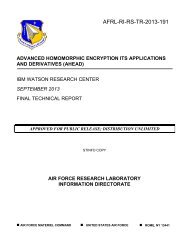EN100-web
EN100-web
EN100-web
You also want an ePaper? Increase the reach of your titles
YUMPU automatically turns print PDFs into web optimized ePapers that Google loves.
Special theme: Scientific Data Sharing and Re-use<br />
Creating the Culture and technology<br />
for a Global Data Infrastructure<br />
by Mark A. Parsons<br />
The Research Data Alliance implements data sharing infrastructure by building social and<br />
technical bridges across cultures, scales and technologies.<br />
Research data are central to human<br />
understanding and a sustained, healthy<br />
society. Data provide the foundation for<br />
the evidence-based research that has<br />
advanced and transformed society in<br />
recent centuries. Data validate the theories<br />
that create the basis of human<br />
knowledge. Now we have bigger and<br />
more varied data than ever and huge<br />
societal challenges. Some say we have<br />
entered a new paradigm of research<br />
where data exploration is leading us to<br />
new theories and understanding rather<br />
than theories guiding our data collection<br />
[1]. This new paradigm will create new<br />
social and economic opportunities.<br />
Much like the Internet evolved from an<br />
academic network to a global communication<br />
infrastructure that fundamentally<br />
changed commerce and employment,<br />
ready and rapid data access can create<br />
new forms of wealth and transform<br />
society as well as research. This transformation<br />
can only occur if there is the<br />
culture and technology of a supporting<br />
and adaptive global data infrastructure.<br />
The Research Data Alliance (RDA, rdalliance.org)<br />
formed in 2013 to accelerate<br />
this transformation. RDA is a<br />
global, community-based, member<br />
organisation,working to build the social<br />
and technical bridges that enable open<br />
sharing of data.<br />
The bridge is an important metaphor.<br />
Bridges are critical to infrastructure. So<br />
with data infrastructure we seek to<br />
bridge and share data across technologies,<br />
scales, disciplines, and cultures to<br />
address the grand challenges of society.<br />
But building infrastructure is incredibly<br />
complex. It is not just pipes and wires,<br />
but also relationships connecting<br />
machines, people and organisations. If<br />
we consider how past infrastructures<br />
developed, it is clear that infrastructure<br />
evolves somewhat organically. It is<br />
never really designed or architected at<br />
the outset [2].<br />
We have seen time and again how topdown,<br />
“build-it-and-they-will-come”<br />
systems do not realize their potential or<br />
simply fail. RDA strives to be more<br />
bottom-up, allowing anyone to join the<br />
organization if they agree to our basic<br />
principles of openness, balance and har-<br />
monization through a communitydriven,<br />
consensus-based, non-profit<br />
approach. Members can work on whatever<br />
problem is important to them as<br />
long as it advances data sharing. We’re<br />
not trying to solve all the data problems.<br />
We focus on implementing data sharing<br />
solutions. We aim to balance a grassroots<br />
approach with just enough guidance<br />
and process to succeed in implementing<br />
infrastructure.<br />
RDA is also about people and the work<br />
they do. In less than two years, we have<br />
more than 2,500 members from Europe,<br />
the United States, Australia and many<br />
other countries. Members are mostly<br />
academics, but there is increasing representation<br />
from the government and private<br />
sectors (Figure 1). We also have<br />
about two-dozen Organisational<br />
Members including tech companies,<br />
libraries and regional efforts like the<br />
Barcelona Supercomputing Center and<br />
EUDAT. These organisations are key to<br />
ensuring the relevance and adoption of<br />
RDA products.<br />
Figure 1: Distribution of 2,538<br />
individual RDA members in 92<br />
countries as of 3 December 2014.<br />
14<br />
ERCIM NEWS 100 January 2015



